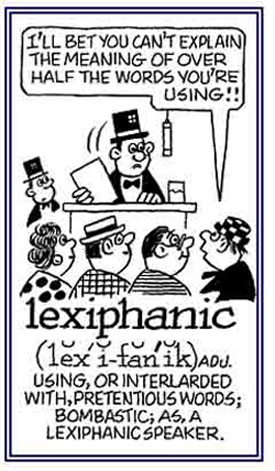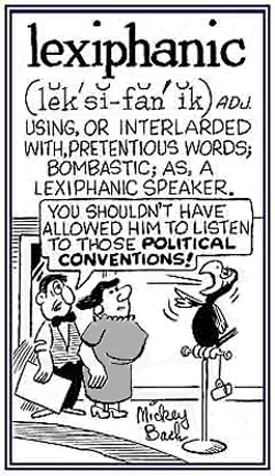lexico-, lexi-, lex-, -lexia, -lexias, -lexic, -lectic, -lexis
(Greek: word or words, vocabulary; a saying, a phrase; speaking, speech)
Closely related to legi-, ligi-, lig-, lect-, -lectic (Latin: read, readable [to choose words; to gather, to collect; to pick out, to choose; to read, to recite]).
lexicostatistic (adjective) (not comparable)
Of or relating to data about words: The composers of dictionaries use lexicostatistic techniques to study the relationships between languages so they can determine the etymological sources for their entries.
lexicostatistical (adjective), more lexicostatistical, most lexicostatistical
1. A technique used in glottochronology: Lexicostatistics is used in order to calculate how long ago various languages developed from a mutual source language.
2. The study of words between languages for historical reasons: An interesting factor in lexicostatistics is the comparison of two languages relating to changes in a list of common vocabulary terms and the sharing of common root words.
2. The study of words between languages for historical reasons: An interesting factor in lexicostatistics is the comparison of two languages relating to changes in a list of common vocabulary terms and the sharing of common root words.
A symbol that represents a word: "Patricia was learning the lexigrams of the Chinese language which she was studying."
lexigraphic (adjective), more lexigraphic, most lexigraphic
Descriptive of the art, or practice, of defining words; or the production of definitions for words.
1. A system of writing in which each character stands for a word.
2. The art or practice of defining words or the definition of words.
3. Sometimes the art of defining words or compiling lexicons.
2. The art or practice of defining words or the definition of words.
3. Sometimes the art of defining words or compiling lexicons.
1. A showing off by using unusual or big words.
2. A phrase-monger or a person who uses bombastic phraseology.
3. Anyone who pretentiously uses words.
4. Etymology: from Greek lexiphanes, "phrase monger", from lexis, "word" + -phaneia, "to show".
2. A phrase-monger or a person who uses bombastic phraseology.
3. Anyone who pretentiously uses words.
4. Etymology: from Greek lexiphanes, "phrase monger", from lexis, "word" + -phaneia, "to show".
lexiphanic (adjective), more lexiphanic, most lexiphanic
1. A reference to, or descriptive of, the use of pretentious words; bombastic: As a politician, Monroe was a lexiphanic writer and speaker, both of which often confused his readers and audiences.
2. Etymology: from Greek lexis, "word" + phainein, "to show".

© ALL rights are reserved.

© ALL rights are reserved.
Go to this Word A Day Revisited Index
2. Etymology: from Greek lexis, "word" + phainein, "to show".


Go to this Word A Day Revisited Index
so you can see more Mickey Bach illustrations.
The use of pretentious, showy, phraseology, style, or flashy words in one's language.
A reference to word sounds or the sounding out of words.
1. The entire stock of words in a language.
2. The diction or wording, in contrast to other elements, of a piece of writing.
3. The total set of words in a language as distinct from morphology; vocabulary.
2. The diction or wording, in contrast to other elements, of a piece of writing.
3. The total set of words in a language as distinct from morphology; vocabulary.
1. The inability to comprehend or understand printed words or sentences, together with the substitution of meaningless combinations of words.
2. A form of sensory aphasia in which one word is read for another one.
2. A form of sensory aphasia in which one word is read for another one.

